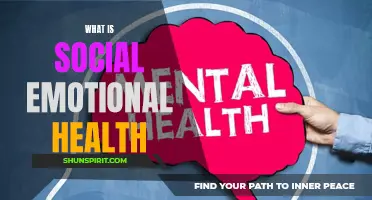
Have you ever found yourself feeling emotionally drained or overwhelmed by your relationships with others? It's a common experience for many of us to become overly attached or invested in the emotions of those around us. However, learning how to detach emotionally can be a valuable skill that allows us to maintain our own well-being and establish healthier boundaries. By developing this ability, we can navigate our relationships from a place of compassion and understanding, without sacrificing our own mental and emotional health. In this guide, we'll explore various techniques and strategies to help you detach emotionally from other people, ultimately leading to greater personal growth and stronger connections with others.
| Characteristics | Values |
|---|---|
| Setting boundaries | Establishing and enforcing personal limits to protect emotional well-being |
| Practicing self-care | Prioritizing self-care activities such as exercise, meditation, and hobbies |
| Developing self-awareness | Recognizing and understanding one's own emotions and triggers |
| Practicing mindfulness | Cultivating present-moment awareness and non-judgmental acceptance |
| Seeking support | Engaging in therapy or counseling to process emotions and gain insight |
| Assertiveness | Communicating needs and desires effectively, while respecting others |
| Letting go of control | Accepting that one cannot control others' actions or emotions |
| Challenging negative thoughts | Identifying and changing negative thought patterns |
| Taking personal responsibility | Owning and managing one's own emotions and reactions |
| Embracing imperfection | Letting go of the need for perfection and embracing one's flaws |
| Prioritizing personal growth | Seeking personal development and growth opportunities |
| Building a support network | Surrounding oneself with understanding and supportive individuals |
| Gratitude practice | Cultivating a daily practice of gratitude to shift focus |
| Engaging in self-reflection | Reflecting on experiences and emotions to gain insight |
| Accepting and embracing emotions | Allowing oneself to feel and experience emotions without judgment |
| Practicing forgiveness | Letting go of grudges and forgiving oneself and others |
| Detaching from outcomes | Focusing on the process rather than fixating on specific outcomes |
| Letting go of past hurt | Releasing resentment and moving forward |
| Setting realistic expectations | Understanding and accepting limitations and embracing realistic expectations |
| Adopting a growth mindset | Embracing challenges and seeing them as opportunities for growth |
What You'll Learn

Understanding Emotional Attachment and Detachment
Emotional attachment is a natural and instinctive response that humans develop towards other people. It is a deep emotional bond that forms through love, care, and mutual understanding. However, sometimes emotional attachment can become unhealthy or overwhelming, leading to a need for emotional detachment.
Emotional detachment is the process of consciously disengaging from strong emotions and breaking the emotional ties that bind you to another person. It is important to understand that emotional detachment does not mean completely cutting off all emotions or relationships, but rather finding a healthy balance and creating boundaries for your own emotional well-being.
Here are some steps to help you understand and practice emotional detachment:
Recognize the signs of unhealthy emotional attachment:
- Feeling dependent on another person for your own happiness and well-being.
- Being overly possessive or controlling in your relationships.
- Having difficulty letting go or accepting change.
- Feeling overwhelmed or consumed by negative emotions when someone is not available or meeting your expectations.
Reflect on your emotional patterns:
- Take some time to reflect on your emotions and patterns of attachment.
- Ask yourself why you feel the need to be emotionally attached to someone.
- Consider whether your attachment is based on genuine love and care or fear of being alone.
- Reflect on how your emotional attachment has impacted your well-being and relationships in the past.
Establish healthy boundaries:
- Set clear boundaries for yourself and your relationships.
- Communicate your needs and expectations to others in a respectful manner.
- Learn to say no when necessary and prioritize your own emotional well-being.
- Establishing healthy boundaries will help you maintain a sense of self and prevent emotional enmeshment.
Practice self-care:
- Take care of your own emotional and physical well-being.
- Engage in activities that bring you joy and fulfillment.
- Prioritize self-care practices such as exercise, meditation, and spending time alone.
- Remember that taking care of yourself is not selfish but essential for your own happiness and personal growth.
Seek support:
- Reach out to trusted friends, family, or professionals for support and guidance.
- Share your feelings and struggles with someone you trust.
- Seek therapy or counseling if necessary to work through any unresolved emotional issues.
- Having a support system can provide you with the necessary tools and encouragement to practice emotional detachment.
Cultivate self-awareness and mindfulness:
- Practice self-reflection and mindfulness to become more aware of your emotions and responses.
- Pay attention to your thoughts, feelings, and physical sensations in different situations.
- Notice any patterns or triggers that may lead to unhealthy emotional attachment.
- By being more self-aware, you can consciously choose how to respond to emotional stimuli and make healthier choices.
Remember, emotional detachment is a process that takes time and practice. Be patient with yourself and understand that it is okay to have emotions, but it is also important to have a healthy sense of self and autonomy. By understanding emotional attachment and practicing emotional detachment, you can cultivate healthier relationships and find greater peace within yourself.
Navigating the Conversation: How to Discuss Emotional Affair Texting with Your Husband
You may want to see also

Identifying Unhealthy Emotional Bonds
Do you find yourself feeling emotionally drained after interacting with certain people in your life? Are you constantly worrying about the well-being of others to the point where it's affecting your own mental health? If so, you may be dealing with an unhealthy emotional bond.
- Excessive worrying: If you find yourself constantly worrying about another person's problems, even when they haven't asked for your help, it could be a sign of an unhealthy emotional bond. While it's important to offer support to those we care about, it's equally important to recognize when we're crossing the line into excessive and unproductive worrying.
- Neglecting your own needs: Are you frequently sacrificing your own needs and desires for the sake of others? While it's admirable to be selfless and caring, neglecting your own well-being can lead to burnout and resentment. It's important to find a balance and prioritize your own self-care.
- Becoming emotionally dependent: Do you rely on another person to fulfill all of your emotional needs? It's healthy to seek support and connection from others, but relying solely on one person for emotional fulfillment can lead to an unhealthy emotional bond. It's important to cultivate a network of supportive relationships that can provide different perspectives and sources of support.
- Feeling responsible for others' happiness: It's not your job to make other people happy. While it's natural to want those we care about to be happy and fulfilled, taking on the burden of responsibility for their happiness can be overwhelming and unsustainable. Remember that everyone is responsible for their own emotions and well-being.
Once you've identified that you have an unhealthy emotional bond with someone, it's important to take steps to detach yourself emotionally. Here are some strategies that can help:
- Set boundaries: Establish clear boundaries and communicate them with the person you have an unhealthy emotional bond with. Let them know what you can and cannot offer in terms of emotional support. This may involve saying no to certain requests or limiting the amount of time and energy you invest in the relationship.
- Practice self-care: Prioritize your own well-being by engaging in activities that bring you joy and relaxation. Make time for self-care rituals such as exercise, meditation, or hobbies that help you to recharge and refocus.
- Seek support: Reach out to trusted friends, family members, or a therapist for support and guidance. Talking to someone who can provide an objective perspective can help you gain clarity on your situation and provide necessary emotional support.
- Focus on personal growth: Invest your time and energy into personal growth and self-improvement. Set goals for yourself and work towards them. By focusing on your own development, you'll become less reliant on others for emotional fulfillment.
Detaching emotionally from other people can be challenging, especially when you have a long-standing bond with someone. However, by recognizing the signs of an unhealthy emotional bond and taking proactive steps to detach, you'll be prioritizing your own well-being and creating healthier, more balanced relationships. Remember, you deserve to feel emotionally fulfilled and supported in your relationships.
Building Group Emotional Intelligence: A Guide to Fostering Empathy and Collaboration
You may want to see also

Practicing Self-Awareness and Self-Reflection
Detaching emotionally from other people can be a challenging task. It involves being able to separate your own emotions from those of others, particularly in difficult situations. By practicing self-awareness and self-reflection, you can develop the capacity to detach emotionally and maintain your own emotional well-being. Here are some steps you can take to help you in this process:
- Take time for self-reflection: Begin by setting aside dedicated time each day or week for self-reflection. This could involve journaling, meditating, or simply taking a walk alone. Use this time to check in with yourself and explore your own emotions, thoughts, and reactions. Ask yourself questions like "How am I feeling right now?" or "What might be causing me to react this way?" By developing this self-awareness, you will be better able to differentiate your emotions from those of others.
- Practice mindfulness: Mindfulness is the practice of being fully present in the moment and observing your thoughts and emotions without judgment. When you find yourself in a situation where you may become emotionally entangled with others, take a moment to pause and observe your own emotions. Notice any changes in your body or any thoughts that arise. By grounding yourself in the present moment, you can prevent yourself from getting swept up in the emotions of others.
- Set boundaries: It’s important to establish clear boundaries with others to maintain your emotional well-being. This could mean saying no to requests that you feel will drain your energy or setting limits on how much time and emotional support you can provide to others. Boundaries may also include limiting your exposure to individuals or situations that consistently trigger intense emotional reactions. Communicate your boundaries assertively but compassionately, and remember that it is okay to prioritize your own needs.
- Develop healthy coping mechanisms: When you detach emotionally from others, it doesn’t mean that you should suppress your emotions or disengage completely. Instead, focus on developing healthy coping mechanisms to manage your emotions. This could include engaging in activities that bring you joy, such as exercising, practicing a hobby, or spending time with loved ones who uplift you. Identify healthy outlets for expressing your emotions, such as talking to a trusted friend or therapist, or even writing in a journal. By finding healthy ways to process your emotions, you can prevent them from building up and causing unnecessary distress.
- Seek support when needed: Detaching emotionally from others can be a challenging process, so don't hesitate to seek support when needed. Reach out to a trusted friend or family member who can provide a listening ear or offer guidance. If necessary, consider seeking professional help from a therapist or counselor who can provide valuable insights and strategies for managing your emotions. Remember, seeking support is a sign of strength, and it can greatly assist you in your journey towards detachment.
Detaching emotionally from others is a process that requires practice and self-reflection. By cultivating self-awareness and implementing healthy coping mechanisms, you can maintain your emotional well-being while still being supportive to those around you. Remember to be patient with yourself and celebrate even small victories along the way.
The Ultimate Guide to Developing Your Emotional Intelligence in 90 Days
You may want to see also

Implementing Strategies for Emotional Detachment
Emotional attachment to other people can often lead to stress, anxiety, and an inability to focus on oneself. Detaching emotionally from others can be a beneficial practice to promote self-care, personal growth, and emotional well-being. If you find yourself struggling with emotional attachment and are seeking ways to detach, here are some strategies that can help you in the journey towards emotional detachment.
Recognize your emotions:
The first step in detaching emotionally from others is to become aware of your own emotions. Notice how you feel when interacting with others, especially in challenging or triggering situations. Understanding your emotional responses can help you identify and address any potential attachment issues.
Practice self-reflection:
Take time for self-reflection to understand the reasons behind your emotional attachment. Ask yourself questions such as:
- What are you seeking from others that you feel you can't provide for yourself?
- Are you dependent on others for your happiness or validation?
- Do you have a fear of being alone or rejected?
By gaining insight into the underlying causes of your emotional attachment, you can start addressing and challenging these beliefs.
Set healthy boundaries:
Establishing clear boundaries is crucial for emotional detachment. Determine what is acceptable and unacceptable behavior from others, and communicate those boundaries. Learn to say no when needed, and prioritize your own well-being and needs.
Focus on self-care:
Invest in your own self-care and well-being. Engage in activities that bring you joy and fulfillment, such as exercising, practicing mindfulness, pursuing hobbies, or spending time with loved ones. Remember, taking care of yourself is not selfish; it is necessary for maintaining emotional balance.
Practice mindfulness:
Developing a mindfulness practice can help you observe and acknowledge your emotions without getting entangled in them. When you notice yourself becoming emotionally attached, take a step back, and observe those feelings without judgment. This practice allows you to create space between your emotions and yourself, fostering detachment.
Foster independent happiness:
Work on developing a sense of independence and happiness that isn't reliant on others. Cultivate self-confidence, self-love, and self-acceptance. Engage in activities and experiences that bring you fulfillment and joy, rather than relying solely on the approval or attention of others.
Seek support:
Detaching emotionally from others can be challenging, and seeking support from trusted friends, family, or professionals can be immensely helpful. Talking through your emotions and experiences with someone who understands and supports your journey towards emotional detachment can provide valuable insights and guidance.
Remember, emotional detachment doesn't mean cutting off all emotions or relationships. It is about creating a healthy balance between your own well-being and your relationships with others. By implementing these strategies and committing to your personal growth, you can learn to detach emotionally from others and cultivate a happier and more fulfilling life.
Proving Emotional Abuse in Louisiana: Legal Strategies and Evidence
You may want to see also
Frequently asked questions
Detaching emotionally from other people can be a challenging process, but here are three strategies that can help.
Detaching emotionally from other people can be healthy in certain situations. It allows you to establish healthier boundaries and prioritize your own well-being. However, complete emotional detachment is not always necessary or advisable in all relationships.
There are several coping mechanisms that can help you detach emotionally from others. These include practicing self-care, setting boundaries, seeking support from friends or professionals, and practicing mindfulness techniques such as meditation.







